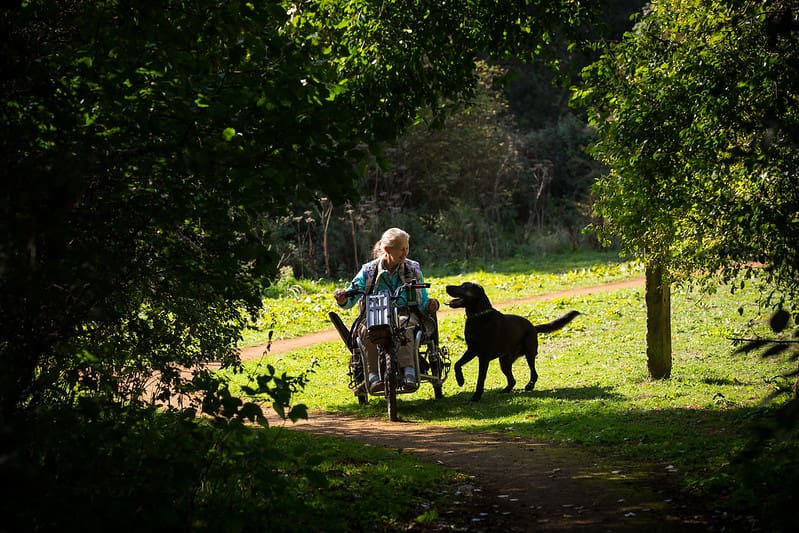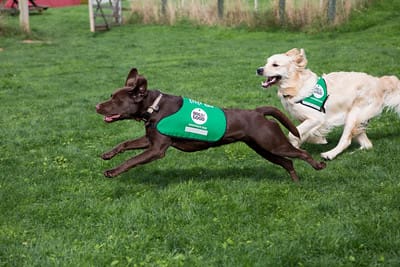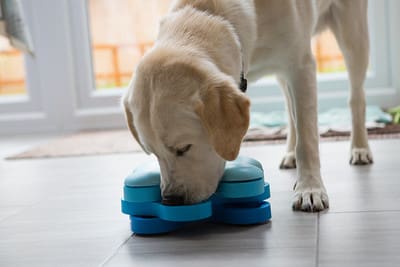Dogs are well known for their ability to make us happy and contribute positively to our mental wellbeing. Whether they’re being silly, gently reminding us that it’s time for a walk or just snuggling with us on the sofa, their very presence is a joy and a comfort.

Through lockdown, we’ve heard from so many of our clients and volunteers who say that their dogs are what kept them mentally together through a very confusing time.
Dogs are great teachers and we can, by following in their own ‘pawsteps’ take our lead from them, particularly regarding mental wellness.
One of our Community Dog handlers, Amy, shared some ideas about what we do to make sure we look after the mental health of our community dogs and there’s some useful lessons for us to think about, too!
Amy’s Five Wellness Tips
Stay Active
Most dogs love a walk and being active, whether it’s chasing a ball in the park, meeting other doggy friends to run around with or just checking out all the latest sniffs. Being out in the fresh air and enjoying nature can really help to lift our own mood, too and the benefits will help long after you’re back inside.

Interactions with nature can improve mood, increase attention spans and reduce stress and anxiety. When you’re feeling low, it can be a big ask of yourself to get up and out but even if you only go a little way and take a few deep breaths of fresh air, your mind and body will benefit.
Dogs are experts at connecting to nature and we can learn so much from them on this topic!
When they’re out on walks and free runs, dogs are constantly listening to the sounds around them. Taking the time to listen and tune into the birds singing, the wind blowing, the rustle of the trees or the sound of children playing is a great way to give your mind a break from the complexities of the day.
Dogs use their noses all the time. Interestingly, they actually have two noses – the one on the end of their muzzle and another one at the roof of their mouth. They use both to size up the world around them; nose down sniffing the grass and ground for info left by their doggy pals or nose up sniffing the air to assess what’s on the wind.
Take a leaf out of a dog’s book and breathe in deeply. Flowers, something delicious cooking, washing on the line, a new jar of coffee… all things that bring a smile to the moment.
Take care of your body
At Dogs for Good, one of the main breeds of dog we work with are Labradors. Quite possibly, their favourite things in the world are eating, sleeping and a good walk. They will rarely let you forget when their next meal is due or when they’re ready to play! They’re also masters at finding the most comfortable spot to catch up on some well-deserved rest.
We make sure all our dogs have healthy and nutritious meals and also enjoy the odd healthy snack. They have lots of time to relax and unwind, either through play or by having a rest.
When life is busy or stressful, it’s easy for us to forget about how important looking after our own body is but it’s essential to do so, in order to support our mental wellbeing. Just like dogs, we can all benefit from ensuring we eat well and getting into good habits with periods of relaxation to help us sleep.
And sleep is essential to help the body and mind repair, refresh, process emotions and gear up for each new day. A lack of sleep can make us feel stressed, anxious and physically unwell.

Dogs need lots of sleep – about 12 to 14 hours a day. They need good quality, uninterrupted sleep, ideally lying flat out with their whole body supported. It’s important we make time for them to sleep by sticking to a routine that allows plenty of time for shuteye. We give our dogs a biscuit before bedtime, make sure that their bed is clean and comfortable, darken the room they sleep in and send them off to the land of nod to dream of free runs, sniffs and breakfast!
Humans need between 7-9 hours of sleep each night to keep mentally and physically healthy. Like our dogs, we need to make time for our own sleep so simple routines like maintaining a regular bedtime will pay dividends. Also making sure that our beds are snuggly and comfy and that the room is as dark and quiet as possible will help the body relax into sleep.
Take a break
While our community dogs may be taking part in two or three therapy sessions during a working day, we make sure they also have lots of breaks in between each session. Breaks help them process what they’re doing, recharge their batteries and aid concentration so they’re able to stay alert for longer. The same goes for us humans; taking regular breaks through the day definitely helps to ease busy minds.
Connect to others
Community dogs are selected for their love of spending time with people. They are sociable and enjoy and seek out spending time with people. The impact of lockdown made many of us realise just how isolating it can be when you are always at home without being able to see friends and family. Feelings of social isolation can play a huge part in our mental wellbeing and there are many people who regularly feel lonely or isolated. If you think someone you know might be feeling lonely or struggling, why not make an extra effort to check in for a chat. It might be just what they need and could help more than you know.
Learn something new
Our dogs love to learn and our community dogs often continue to learn new skills throughout their working life. Often, these new learnings will come as part of the sessions they carry out with a new client where their handler – like Amy – will tailor an activity specifically to suit the needs of the individual. We train all our dogs using positive reinforcement methods and, as a result, our dogs really enjoy learning new things. Setting yourself a challenge to learn something new can bring fantastic social and emotional benefits and your new skill can be however big or small you want it to be. You could try out a new hobby, find a new recipe to cook, become a volunteer, start an exercise class or even go back to college. See what’s out there!

Remember, dogs are great teachers and we can, by following in their own ‘pawsteps’ take our lead from them, particularly regarding mental wellness.